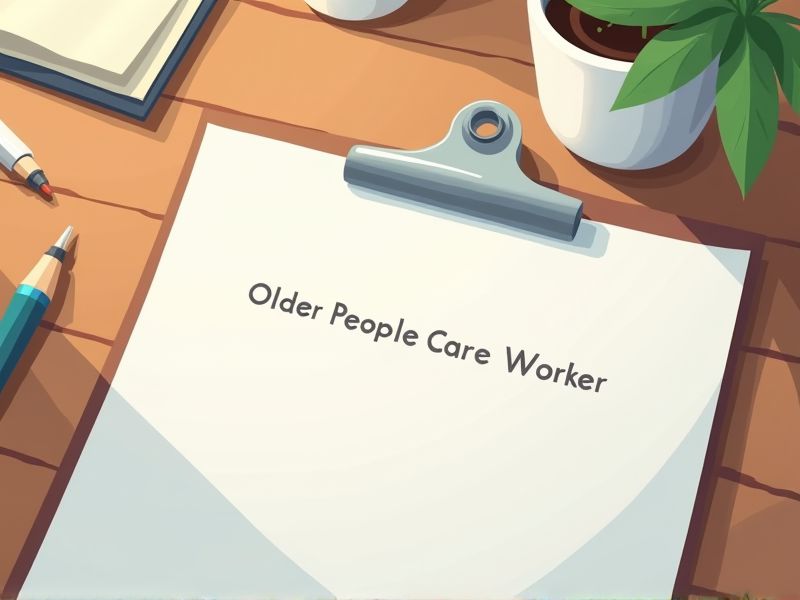
Older people care workers require specific certifications because they often assist with medical and daily care tasks that demand specialized knowledge. Certifications ensure that workers possess the skills needed to address the varied health challenges faced by older individuals. Registered training also strengthens trust and accountability between caregivers, clients, and their families. Some important certifications you may need for older people care work include First Aid, Manual Handling, and Dementia Care qualifications.
Certified Nursing Assistant (CNA)
Certified Nursing Assistants (CNAs) provide essential medical and daily living support to older adults, fulfilling a growing need as life expectancy increases. Their training equips them to monitor vital signs and recognize health changes, contributing to early intervention and better management of chronic conditions. CNAs also offer companionship and emotional support, which significantly enhances the quality of life for older individuals. They bridge the communication gap between patients and healthcare providers, ensuring a higher standard of coordinated care.
Home Health Aide (HHA) Certification
Home Health Aide (HHA) certification ensures that caregivers have the essential skills and knowledge to address the unique needs of older adults, such as medication management and personal care assistance. Proper certification mitigates risks associated with improper care, reducing the likelihood of injury or mismanagement. Certified HHAs can perform medical tasks like vitals monitoring, improving the overall quality of care for elderly patients. Certification offers assurance to families seeking reliable and competent care for their aging relatives, fostering trust and peace of mind.
CPR and First Aid Certification
Older people often face medical emergencies such as cardiac arrests and falls, where prompt response can significantly affect outcomes, thus CPR and First Aid certification is crucial for caregivers. Such training equips care workers with the skills to stabilize individuals until professional medical help arrives, potentially reducing complications. Certified workers can better mitigate health risks and improve the safety of the care environment for older individuals. Many regulatory bodies and care facilities require this certification to ensure a standard level of competency among staff.
Alzheimer's and Dementia Care Certification
Increased certification in Alzheimer's and Dementia Care ensures that older people care workers possess the skills necessary to handle complex and unpredictable behaviors associated with these conditions. Specialized training equips caregivers with strategies to manage symptoms such as memory loss, confusion, and mood changes effectively. Enhanced understanding of dementia-specific communication helps to create a safer and more supportive environment for patients. Recognizing early signs of cognitive decline can improve care outcomes and contribute to better quality of life for the aging population.
Medication Administration Certification
Medication Administration Certification is crucial for older people care workers because it ensures they have the necessary skills to safely handle and administer medications. Proper certification reduces medication errors, which are more common among the elderly due to their complex medication regimens. Certified care workers are equipped to recognize adverse drug reactions, contributing to the overall safety and well-being of older adults. Regulations often mandate such certifications to guarantee a consistent standard of care across facilities.
Personal Support Worker (PSW) Certification
PSW certification equips caregivers with essential skills specifically designed to address the complex needs of older adults, enhancing their well-being. Training ensures caregivers understand medical protocols, effectively using this knowledge to offer safe and reliable care. Certified workers are recognized for their professionalism, fostering trust with families needing assurance of the best care for their loved ones. The certification provides legal and professional standards, reducing incidents of neglect and ensuring a higher quality of care.
Mental Health First Aid Certification
Mental Health First Aid Certification enhances a care worker's ability to recognize signs of mental health issues in older adults, leading to timely and appropriate interventions. Older individuals often face issues like depression and anxiety, which, if left unchecked, can exacerbate other health problems. With this certification, care workers are better prepared to provide empathetic support and guide older individuals towards professional help. Improved mental health care enhances the overall quality of life for older adults and can reduce the strain on healthcare systems by preventing complications.
Geriatric Care Management Certification
Geriatric Care Management Certification provides specialized knowledge crucial for understanding the complex health issues that older individuals face. It enhances the ability of care workers to develop tailored care plans, addressing the unique medical and emotional needs of seniors. With certification, care workers are better equipped to coordinate with healthcare providers, ensuring comprehensive and effective care for the elderly. This certification also increases the trust and confidence of families and seniors in the care provided, leading to improved caregiving outcomes.
Infection Prevention and Control Certification
Infection Prevention and Control Certification equips care workers with essential knowledge to minimize the spread of infectious diseases among older adults, a population highly susceptible to infections. Proper certification ensures adherence to standardized protocols, reducing the risk of catastrophic outbreaks in care facilities. By being certified, care workers can more effectively implement hygiene measures and recognize early signs of infection, safeguarding residents' health. Certification fosters an environment of trust and safety, reassuring families about the level of care their loved ones receive.
Respite Care Certification
Respite Care Certification equips care workers with specialized skills to reduce caregiver burnout in older people care. Certification ensures adherence to established care standards, making quality care more consistent. It validates a care worker's ability to handle complex health needs of older adults, enhancing trust among families. Certification often leads to better job opportunities and higher pay, incentivizing workers to pursue continuing education.
Summary
You gain enhanced trust and credibility from clients and their families as a certified Older People Care Worker. This credentialing often leads to higher job satisfaction, as the added knowledge and skills effectively improve the quality of care provided. Employers may also offer you more competitive pay and advancement opportunities due to your certified expertise. Consequently, client outcomes generally improve, reflecting the enhanced competence and confidence you bring to your role.
